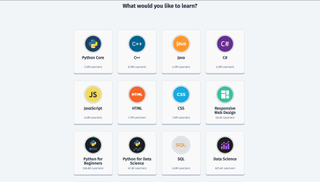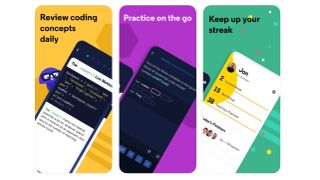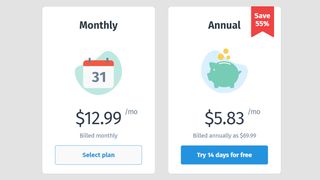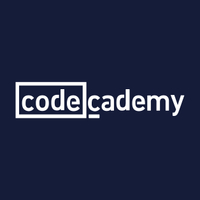If you have always wanted to try your hand at coding, now is your time to shine. Coding is in demand again, and it’s not just because of the lockdown. Data from the US Bureau of Labor Statistics shows IT-related jobs are projected to grow 11% in the next few years, which is significantly faster than jobs in other industries.
Aiming to fulfil this need, multiple learning platforms have ramped up their efforts to make coding lessons accessible to all. Codecademy and SoloLearn are two particular ones that stand out for their high-quality lessons and ease of use.
Codecademy, as the name suggests, is an e-learning platform to learn how to code. It has become popular in recent years for its comprehensive resource library that anyone can access at any time for free. SoloLearn is an app plus web-based platform offering a wide selection of computer language courses for free. The lessons are short and the interface is easy to use, even for beginners. Both platforms have much to offer for people learning how to code, with paid-for options that can help buff up your resume, but which one would be right for you?
The platform you should choose depends on what you’re looking for in an e-learning platform. Some users prefer long series-style courses while others prefer short, quick-learn lessons. If you want to find which category you belong to, take a look at our guide to the best coding courses online and see what works best for you. Or, if you're still trying to decide which language you want to learn, have a look through our piece on the most useful coding languages to learn in 2021.
Codecademy vs SoloLearn: Subjects Covered
Codecademy: Codecademy offers lessons in multiple programming languages including HTML & CSS, Python, JavaScript, Java, SQL, Bash/Shell, Ruby, C++, R, C#, PHP, Go, Swift, and Kotlin. You can also access theoretical lessons in web development, cybersecurity, data visualization, machine learning, game development, and more.

SoloLearn: SoloLearn teaches Python Core, C++, Java, C#, HTML, CSS, JavaScript, PHP, SQL and more. You can also learn responsive web design, machine learning, coding for marketers, and data science among other related subjects.
There's not a great deal of difference in the languages available, so it's unlikely that this will be a deciding factor in your final decision between the platforms. What is noticeable though is that Codecademy offers more topics within languages, for example exploring things like financial analytics in Python and offering advice on how to pass technical interviews. So will the breadth of languages is broadly the same across the platforms, there's a deeper learning pathway available via Codecademy.

Codecademy vs SoloLearn: Ease of use
SoloLearn has a user-friendly app that helps you learn on the go. Even its web-based platform is quite responsive and easy to navigate with clear instructions. But Codecademy offers a great user experience as well. The platform has attractive graphics and illustrations with a pleasant site design, which makes coding seem less intimidating. It also has multiple quick access buttons on the homepage to help you find what you need in a single glance. And like SoloLearn, it offers an app so you can learn on the go.
If ease of use is important to you, then either platform should meet your needs. But we think that the SoloLearn app is slightly better than Codecademy's offering.

Codecademy vs SoloLearn: Price
Codecademy offers its basic courses for free, so you can access high-quality material at little to no cost. But if you are a seasoned learner, looking for intermediate and advanced projects, you may have to buy a Pro membership. This is $39.99 if you buy one month at a time and $239.88 ($19.99 per month) if you buy a yearly subscription at once, which is roughly in line with the costs of the best online learning platforms.
Codecademy also has a student membership option where you get access to the same features at $149.99 per year. Want to try before you buy? The good news is Codecademy offers a free seven-day trial so you can explore the platform and see if it is the right investment option for you.
If you don’t want to spend any money on coding courses just yet, we recommend going for SoloLearn. Courses on SoloLearn are free, so you don’t need a membership to access resources, making it an ideal option for students and learners with tight budgets. However, SoloLearn also offers a PRO membership at $12.99 per month for a monthly plan and $69.99 for a yearly subscription.

Why subscribe when most of the content is available for free? PRO users get an ad-free experience and added features like personalized learning paths, community interaction, and access to premium study challenges.
SoloLearn is considerably cheaper than Codecademy so if price is an issue for you, we recommend choosing SoloLearn as it offers numerous excellent courses at a budget-friendly price. But if you're an intermediate learner, you'll need to fork out to learn anything new.
Codecademy vs SoloLearn: Teaching method
Courses on both platforms are created by trained professionals so you are sure to get the highest quality of training. Courses on SoloLearn are clearly outlined and offer multiple practice questions for better learning. Most exercises can be repeated until you get the right answers.
The downside is there are no teachers or tutors available to help. If you are stuck, your only option is to visit the student community center and browse through the comments. If you have a PRO membership on SoloLearn, you have the option of interacting with other learners in the social forums, networking, and building your profile like social media platforms. This is great for users who enjoy learning in groups.
Codecademy has a user-friendly interface where you can practice coding with the instructions visible right on the screen. This is ideal for new learners who haven’t memorized the material yet. Codecademy has a more robust community where you can discuss your problems and get prompt answers. You can also join Codecademy Live which is a weekly series featuring curriculum developers teaching popular courses like Visualize Data with Python. There's also a friendly Discord where the community can help you out with problems.
Codecademy vs SoloLearn: Summary
Both Codecademy and SoloLearn offer comprehensive, beginner-friendly courses that appeal to learners at various stages of their coding journey.
Both platforms are fairly easy to use, but it really comes down to price and course content. If you're just at the beginning of your coding journey, then you might want to go for SoloLearn. It's completely free and offers an engaging app that you can use on the go.
But if you're looking for intermediate courses, then Codecademy might be better suited to your needs. It explores the various coding languages in more detail and allows you to quickly communicate with other uses when you need some help.



